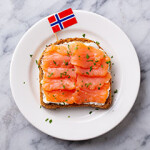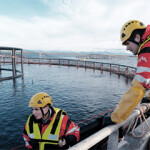RAS farmer Danish Salmon celebrates first profitable year

Danish Salmon, a recirculating aquaculture system (RAS) salmon farming compan, achieved a financial turnaround in the fiscal year ending 31 March, 2023.
The Denmark-based company, which was purchased in part by Marubeni in 2020, saw a significant increase in revenue for FY 2023, which helped it achieve a profit for the first time in five years.
The company posted revenue of DKK 57 million (USD 8.4 million, EUR 7.6 million), a DKK 18.1 million (USD 2.6 million, EUR 2.4 million), or 46 percent, increase over the DKK 38.8 million (USD 5.6 million, EUR 5.1 million) in 2022.
Its production costs reached DKK 53.8 million (USD 7.9 million, EUR 7.2 million), up from DKK 44.5 million (USD 6.5 million, EUR 5.9 million) in 2022 – a 20 percent increase.
The company’s profit before tax reached DKK 971,000 (USD 143,000, EUR 130,000), up from a loss of DKK 10.4 million (USD 1.5 million, EUR 1.3 million) in 2022; and the company’s overall profit reached DKK 705,170 (USD 104,100, EUR 95,000), up from a loss of DKK 8.1 million (USD 1.2 million, EUR 1 million).
The company, in its financial statement, said achieved higher production in FY 2023 thanks to improved biological performance and increased efficiency.
“The result for the fiscal year shows a profit for the company, which underlines the profitable prospects for land-based salmon farming,” Danish Salmon said.
The company is finalizing a large production expansion, which it said will bring further scale and profits.
“The general market has seen great uncertainty from the competitive Norwegian market, with tax-related matters disrupting the market,” the company said. “This has to some extent impacted Danish Salmon as well, which emphasizes the need for the company to further distance itself from the Norwegian market-prices on salmon by stabilizing its own production and generating activity in a differentiated market.”
The company said it expects to reach steady-state high production in its new facilities in the next fiscal year and will gradually increase production until it reaches weekly harvests.
“The challenges will be to bring the biological performance of the new water-treatment systems up to full potential,” the company said. “This is a process which requires time.”
Photo courtesy of Marubeni






Share